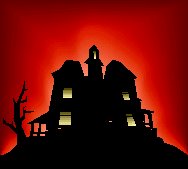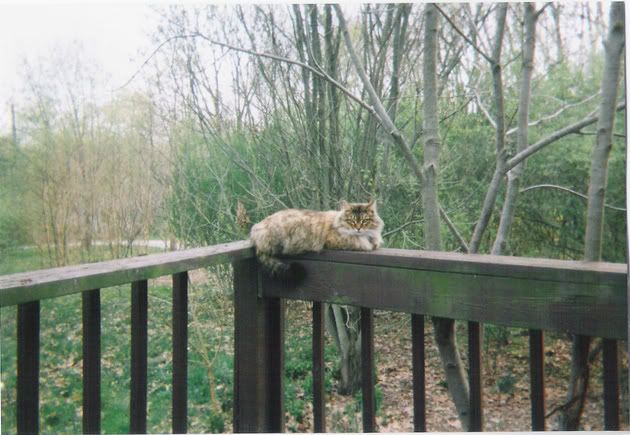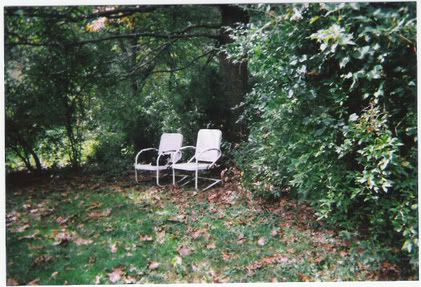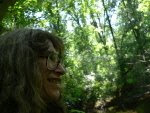Not an Empty House
By Sue Marra Byham
“Margery” was an old-fashioned name she might have grown up to resent. But she had been a thoughtful, sensitive child who liked the way it felt when she said it, liked the way it sounded, the way it looked on a page. She was named for an ancestor, an Edwardian hell-raiser for peace and women’s rights, but Margery’s interest in that era was all in its houses and, though perhaps the ideal was seldom realized, in its vision of home.
Margery spent a good deal of time in her teen years writing letters to bosom friends of both sexes on fancy paper with colored ink, enclosing little homemade gifts like velvet pencil cases and folded paper stars, or tiny beribboned locks of her long hair.
She put off going to college because she wanted some modern approximation of a grand tour, and a brief illness gave her a plausible excuse. She bought a plane ticket with money accumulated from birthdays and holiday gifts, and spent almost six months living out of a knapsack in Britain and accumulating long skirts and jewelry in Europe, traveling with a succession of new acquaintances before being called abruptly home--but “home” had been sold by the time she got there.
For a year, she was a commuter student. It was not the university she would have chosen, but she tried to be optimistic. Margery told herself that learning was something you had to do on your own anyway. She took a self-conscious interest in everything around her, particularly as she traveled between school and the shoebox-style rancher she now shared with her mother. (Home is where the urn is, said this bitter woman, pointing to Margery’s father’s ashes.) Riding the bus was a new adventure.
The urban neighborhood through which she walked in the long skirts she had brought back with her was a new world.
At the center of that world, at the top of a hill, stood a crumbling Victorian row house, alone, surrounded by the rubbled remains of its former companions.
At first Margery wanted to close her eyes when she passed by the house. This pitiful shell of vintage grandeur tugged at her chest, at a place that already ached with unshed tears. It had once been the coveted corner house. She pictured it bigger and more stately than a row of similar, but lesser, three-story houses. It was scarred on one side by the sooty floor and ceiling lines of an old burned out, torn down neighbor, an architectural amputee. It was flanked by trash on vacant lots, the sole residence remaining in a wasteland of boarded-up offices and sadly-damaged commercial properties.
The first time she saw the house she tried to avoid the old ruin by crossing the street, but she only did that once. It felt wrong. Shading her eyes from the glare of the sun as she jaywalked away, the roofline’s silhouette imprinted itself reproachfully on her eyelids. She felt as if she had ignored an old friend with a terminal illness, one who knew that she was aware of his presence, but would rather remember him as he was in better days.
So in an oddly conciliatory mood, Margery began to give the house her full attention, to walk as closely to it as possible every day, to examine all of its visible features and try to guess its invisible ones.
The longer she looked at the house, the less she noticed the dirt clinging to the windows, the grit and tar paper blowing off the roof, the flaking paint, the rotting wood, the pitted stone; instead she saw a noble outline caressed by light and shadow, softened by remnants of lawn and shrub. Sometimes she thought she saw more, as though glimpsing a bright young face hiding inside a wrinkled one.
The house had had a name to conjure with once, though the name was now lost to time, the brass name plate now blackened and illegible. There was a wrought iron stair rail, all magical curlicues and twists, as if it had once been as pliable as licorice. If she stared at it, her peripheral vision went fuzzy. There might be fresh green paint on the front door, the blackened letter slot might be shiny reflective brass with a figural door knocker to match, a lion, or something less usual. A gnome.
There would be stained glass over the door, glowing peacock feathers, iridescent green and cobalt blue. A cat might sit on the marble steps, which would not be cracked, which would have been scrubbed clean and white every morning. A Persian cat. Marble planters on either side might hold boxwood, seasonal arrangements. There would be flowers or greenery in boxes under every window, boxes painted a slightly darker green than the door. Somewhere along the street would be a hitching post, something decorative in iron with a brass ring.
The tradesmen would have pulled up behind the house, there’d be a wood post in the alley; they might be bringing ice for the icebox or coal for the cellar. There was a peddler, who also took away rags. Lace curtains. They’d be open in the summer, lined with mosquito netting, which would also keep out much of the soot. Vendors would call their wares in mesmerizing rhythms as they walked or drove their routes, bringing treats like hot chestnuts, or cool strawberries.
A Hurdy-Gurdy pulled by a white horse. Bells ringing at noon. A sweep. A knife sharpener. A boy who sold newspapers at the corner. A man sweeping the litter in the sweet.
Margery passed the house twice daily as she walked between the disappointing university and the bus stop. It had long ago been divided into apartments. It might be a hundred years since it had belonged to a single household.
There were a couple of friendly tenants. She sometimes stopped to talk to them. One woman planted pansies out front in an old tire that had been painstakingly fringed and painted purple and white. Her elderly father wet down the stoop with a bucket of water every night and swept it clean. In spring there were couples who gathered around a hibachi sometimes, or a boom box, and in summer there were sweaty families asleep on beach towels or propped up against the door.
Margery exchanged smiles with these people at every opportunity. But they had reason to be wary of intrusive strangers. Only the people standing at the bus stop drinking out of paper bags always smiled back. No one seemed willing to go further than hello.
Sometimes she pretended she was headed to the front door that so often stood open. Maybe she had been invited to a birthday party or a barbecue. She would have been glad just to sit on the stoop and visit. But how she longed to go inside.
She would have made friends with the children if she could. (Margery’s father had encouraged her, when she was an eager toddler, to think of strangers as friends she hadn’t met yet. But what had that attitude done for him? Turned his own youthful enthusiasm to misery.) Margery laughed when the children were laughing. She waved. Often their people grabbed on to them and stared her down the street. She didn’t try to speak to them.
As the weeks went by, and the house seemed to shrink down a little, to melt (like new tar) in the summer’s heat, she decided that the seemingly doomed building housed a tremendous spirit. Something that could not be destroyed was strong and intact there.
The house seemed to wear its graffiti proudly; the bright hieroglyphics were like medals for valor in a war against ugliness and despair. Yet day by day she grew sure that somewhere it also existed wholly as it had been in its prime. Perhaps preserved by the affection of its people, or by the loyalty of its sparrows and its squirrels and its mice. Maybe because it was really some unfathomable entity only inhabiting bricks, glass and wood. She didn’t pretend to know the why, but the imagined vision gradually became a certainty, a story she told herself as she passed the house four times every day—she had found a temporary clerical job to fill her afternoons and pay for books.
At first she thought about the house mostly to keep from thinking about other things. There was no sense in mulling over what she couldn’t do anything about. There was no sense in regretting a past or planning a future when she was powerless to do anything about either.
One day at the end of the summer a blue tarp appeared at one end of the house where a chimney had been; Margery signed up for the one class she could afford on her own and she did not go home, because again, there was no longer any home to go to. Instead she moved into a tiny, walk-in closet of a room. Its chief features were a hot plate, a fire escape, and surreptitious use of the bathroom in the laundromat downstairs.
On that day, she realized she felt the house. It was at the edge of her awareness, like going into a room and being able to tell whether she was alone or not. She was not alone. The house was there, was conscious, whether or not it was conscious of Margery. That was a marvelous enough secret, (all the better because there was no longer anyone in her life but the house to tell her secrets to,) but somehow that was only part of it. She also knew the desire of the house to shelter and protect, to be beautiful, to be loved. She knew this the way she knew her own hungers, perhaps because she was hungry with desire of the very same things. And she knew that it knew.
She wanted to tell the house about her little room, about the sleeping bag on the floor, and her diminished expectations of ever doing anything worth doing, of ever doing anything at all beyond meager repetitive tasks, as though it would be sympathetic, embrace her if it could, gather her in somehow. She wanted to tell it that she had two temporary jobs now, and no energy, and no money for another semester, and that she used the bar soap from the laundromat restroom where she bathed at night to wash her hair.
The house did not look ruined when the sun or the moon shone over its roof; at twilight and at dawn it exuded peace and confidence. There was a sense of its belonging right there, unhindered by time, forever. She wondered whether it felt alone in the universe.
She was unaware that the moonlight restored the youthful trustfulness and hope that had disappeared with the baby fat from her own face when she began paying her own lonely way in the world. The warm sun she loved was cracking her skin like cement, privation and fatigue were making empty metaphors of her soul’s windows, she clenched her teeth at night like deadbolts against intruders.
Somewhere in very different neighborhoods her old acquaintances would be finishing up their internships and semesters abroad. They’d be starting careers. She had only a vague idea how it must be. None of that seemed real, here. She lived in a place they would have driven through very quickly, and only if there were no avoiding it. She longed for a few words from people they would have found of no interest, invisible, if they passed them on the street. But her old friends were of no interest to her now. She wondered how she could ever have managed to overlook their complacent superiority, their insufferable arrogance and ignorance. They were just the sort of people who tore down wonderful old houses, no matter who cherished them, who destroyed beautiful old neighborhoods, oblivious to their history, who were reckless of everyone’s happiness but their own.
Two years and a succession of minimum-wage temporary jobs later, Margery was taking one evening class per semester and having to skip classes when her work schedule changed. There were only a few, furtive tenants left in the house, no children, no smiles.
There would have been no flowers either, but she snuck over one night and planted pansies in the faded purple and white tire, and when she rushed by at 2am from the sandwich shop where she was subbing for an alcoholic cashier whose brother owned the place, she would pause to see if the soil needed the gallon of water she toted.
She rushed because at that hour on that bus route she was apprehensive. She felt sick. She felt worn. But not when she nurtured the pansies. They responded to Margery’s touch like pets, eager to please and be pleased. They bloomed large and bright in that place as though in a sheltered garden tended by a woman who could spend time as freely as she liked.
One afternoon, having paused to admire her pansies, she finally slipped through the front door of the house. It was in order to avoid an exchange student she had known in her traveling days who was getting off the bus. (What could they have to say to one another now? Are you seeing anyone? Yes. No. I love a house. She couldn’t even offer him coffee.)
She forgot all about him when she closed the door behind her. It was as though she had been dreaming, and now the dream was finally taking a good turn. The hall was a wash of vertigo. Her heart was pounding with a back beat. Then she discovered the tile, a splendid mosaic of royal blue, yellow, green, and a white that was aging like real pearls. For a while she just stood and looked, waking as she found herself wiping the dust away with her fingers.
Someone had been prying the pieces loose. Everything else that could have been sold for scrap was already torn out.
She walked around. The oak floor was scarred with things dragged hastily through. It was layered over with grime. But grime was easy to look past. She closed her eyes for a moment, trying to drink everything in. She smelled—dirt—but beneath that, there was something else.
She went back to the tiles, trying to trace the faint scent. She couldn’t think what it was. But it was pleasant. Beside the front door there was a row of mailboxes. In the wall opposite, papered rather than tiled, were two doors with numbers on them. She thought she saw a fragment of a red flocked design in the corner where a leak was peeling away layers brown with age.
Someone had heard Margery’s footsteps. The door on the left cracked open. He was holding a gun. He put it in his pocket. She looked away, at the names over the mailboxes. Sorry, wrong house, she said. She turned her back on him and left, wondering if she would she ever see past the hall.
One day a sign on the front door said the house had been condemned by the department of licenses and inspections. Margery had been laid off from a decent clerical job, and was passing by on the way to the unemployment office, on the way back to temping. She heard a stereo in a downstairs apartment. Several days later the sign was gone, but people were moving out.
Margery wondered whether the house dreamed of the days before wrecking balls and looters, transients and squatters, leaks and roaches and feral kids, if it was able to escape to its past or dream its future. She was sure it had a life beyond the quiet street where the store fronts that weren’t boarded up were for check cashing emporiums, loan sharks or food banks.
She wondered whether the house minded harboring the homeless at night, and thought perhaps it didn’t. She wondered if they wandered somehow into its mysterious heart, if they felt its awareness. She wished she had the nerve to crawl through a cellar window where the bars were broken, and stay til morning.
She sought the house in every change of weather at every time of day, to see the changes in its façade, in its face. She was skipping classes anyway, while she looked for a third temping job, or a better, permanent position.
Her own face went on changing; it was growing stoic and wary but still openly compassionate, a troubled face, and her eyes were duller. She always seemed to have a cold or a sore throat or both.
It was December when she saw the police cars double-parked out front.
She was passing the house numerous times a day, working a grueling schedule to pay for tuition and a room rent increase. (Who didn’t prey on the desperate? The guy who owned the laundromat had sure seen her coming.)
She was distressed, rushing forward for a moment, as though it were any of her business what the police were doing there. She smelled roses briefly as she walked away. Bourbon roses, she thought.
Sometimes people sat out front drinking out of paper bags. But there was something hidden in these faces. Missing. She didn’t make eye contact. Sometimes there were people upstairs lowering small packages out of windows. The police came again and someone boarded up the windows and put padlocks on the doors. There was no longer any evidence of regular tenants, no shortage of derelicts.
Margery began to take away the worst of the trash that touched the house itself. She carried a grocery bag, and used a rag she found to pick broken bottles and chunks of glass from the stoop. With a strange joy she realized she was free to put crumbs there now, to feed the sparrows. That she might sit on the stoop herself.
She walked all around the building, then, starting from behind where the chain link fence had been split, and going right through the hip high weeds and into the side alleys. She was not afraid. Death didn’t frighten her. And something told her the house was just resting with its memories. It was not dead.
Suddenly it occurred to her that these days couldn’t last forever; she wanted something from the house that she could keep with her, always. She was frightened that one day the lot would be empty, there would be bulldozers and cranes and nothing visible of the house at all.
She wanted to give the house something more than her attention, to give it something of herself, for always, too. If this was strange, so what. She had no one to answer to, no one to argue that the love she felt for the house might be irrational, or unrequited. She had none but her own heart to trust.
She found a coin. She didn’t really have to look for it, she just scraped her toe in the ground near a cellar window, carefully, since there were so many fragments of glass embedded in the mud in that spot where the soil was foul with oil, and the grass wouldn’t grow anymore. From there she walked a straight line to where bits of old lawn started up in little patches again. She bent forward looking for four leaves among the clovers and found it, an 1898 Morgan silver dollar, an eagle on the back and a woman she supposed was Lady Liberty on the front.
Lady Liberty. That had a nice ring to it. It would make a nice alias. Or it might be the lady was a goddess lending her inspiring likeness to the coin. She had a sweetly indomitable face.
Margery pulled the ornate silver stick from her coiled hair and half buried it where the coin had been.
She searched the rubbish in front of the house until she found a length of telephone wire. She took this home and picked apart the rubber insulation to get at the fine copper wire inside. It took her all evening to make a net bag out of the wire that would hold the goddess coin safely on a knotted cord around her neck.
She was wearing this the next day when she saw the boards pulled away from one of the doors at the back of the house. The room behind it had been the old kitchen.
It was partly below ground, because of the hill. She walked through the three rooms on that floor, one behind the other, empty but for trash, mostly vagrants’ carpet remnants, newspapers, and the detritus from fast food meals.
The cellar door and another door at the top of the stairs were locked. The walls had been white. Most of the doors had been replaced or torn off their hinges, but one door in the kitchen, presumably the door to a pantry, was old wood. Under the steel padlock an iron latch was half off as though someone had thought to scavenge it and got tired of prying. The ceiling was high. A wire dangled from the center. There were lots of windows.
There must have been an array of pipes missing, sharply-angled corridors to help contain any unpopular odors such as the corned beef and cabbage they would have had on St. Patrick’s Day. Were those the remains of a Rockingham teapot? No, of course not, it was dirty brown glass that had caught the light, from some poor wanderer’s cheap bottle of beer.
She wanted to sit on the floor and close her eyes and imagine the house becoming itself around her, a cast iron nutcracker in the shape of a bulldog attaching itself to a sturdy plank table, hooks reaching down to catch the copper pans flying toward them, but felt that it wasn’t safe, she ought to go.
She kicked up a fragment of very old cardboard from a box which had once held a top hat. There was an advertisement for the hat pasted on it. She held this, breathing in its fragrance of lingering time, as the afternoon darkened. The days were getting very short again. She put the cardboard in the pocket of her skirt.
After she came through the window to the alley someone as dark and thin as a shadow slipped in.
When she went home that night she sat up in bed and closed her eyes and imagined herself back in the house. She willed her hands to feel the rough oak on the kitchen floor, pretended to breathe, not the odors of urine, spilled beer, mildew and mold and wet wood, but a wood stove, bread dough rising on a shelf at the back, little bundles of lavender in a pile of tablecloths.
There was no heat in her closet room, and not enough food. She was out of work, with no unemployment check and no prospect of a job until she stopped having the flu, which didn’t seem likely when she couldn’t afford a doctor to prescribe any medications to set her on her feet.
She continued to take a walk to see the house every morning. She went to a consignment shop once a week until she’d sold everything she had worth selling except the hot plate and her sleeping bag and the few treasured bits of jewelry she kept in her purse. She began to feel badly enough, upon waking, to wonder whether she would manage to see the house that day. But though her steps slowed, she always went, and she always felt better.
One January morning she came downstairs to the laundromat to use the bathroom to get ready to look for an interview. She surprised a man, who had braved the cold in threadbare denim, using a crowbar to pry open the coin box on one of the washing machines. He turned, scattering coins to the floor.
Jackpot, Margery said, smiling. She was happy for him. She walked back upstairs.
Later she thought she saw violets growing at the house, by the front stoop. She rubbed her eyes to bring them into focus, and they disappeared. She glimpsed a glittering white damask tablecloth hanging from a wash line, but only for a second. She began to think, as she turned the corner, that someone somewhere played a piano, though it was just an impression, and no particular tune.
The walk became increasingly painful as the weather turned stormy and cold. She put a baked potato in each pocket to keep her hands warm until the day she found the electricity in the room had been turned off, and she had to defrost her toes over a steam vent down the street.
Late one February afternoon a weakness took hold of her. She needed to sit down, somewhere no one would see her.
She looked longingly at the house. The kitchen door was off its hinges, though it had been padlocked as always when she last walked by. She headed for it numbly, floatingly, not seeming to make contact with the ground, and it occurred to her as she sat again on the kitchen floor that it was so cold she might die of hypothermia if she didn’t collect herself quickly and go back to her sleeping bag over the laundromat. At least the dryers vented on either side of her. Still, she stayed, and thought.
The laundromat wouldn’t be home much longer. Her savings were gone. She was several months behind in the rent, (pittance though it was, or would have seemed, in the days when she and her companions explored Europe like protégées of Henry James.) Maybe she should bring her sleeping bag here. Maybe there was a nook she could hide in. Perhaps she could enter the pantry. Perhaps bar it, for protection, from the inside. There might not be any really frigid winter days after this one.
If there were, she would gamble with Fate for her happiness. Let it save her, or not, just as it would save or abandon the house.
Death was a safe place. Maybe it was the only safe place. That was why people sometimes killed the ones they loved—so nothing bad would ever happen to them. That’s why her father should have taken her with him. Instead he had abandoned her. He should have guessed her mother would flee the daughter’s face that so resembled his, once he’d saved himself. That she and her mother would blame each other for his pain, and the way he’d ended it. Maybe he’d gone to a place of healing on the other side, if there was an other one. She wished them both well, without wishing to see them again.
Time passed quickly as she daydreamed, nodding, thinking sometimes that she heard a fire kindling, and when it was hot enough, she heard coffee beans rattling in a pan, smelled them roasting. The smell was real for a moment, edging out her numbness, and the blood beating in her ears was like a familiar voice telling her to wake. A house, she thought, was home because it was part of you. It was a permanent refuge. It was forever.
She heard the door open, footsteps, but she was stone cold now, past getting up quickly, past caring, too sleepy to open her eyes. There was a crash, but she didn’t hear it. She was having a feverish conversation with the house. She was beseeching it to let her in.
When the authorities found the body, it was tucked under a faded quilt that fell to pieces when they lifted it onto the stretcher. A few down feathers, blindingly white in their dingy surroundings, drifted overhead as though they had also disturbed a pillow.
As they closed the body bag and carried out the remains of a short life, a plain needle made of wood, the sort she might have used to knit socks, fell from her coiled hair, and there was a sound that sent chills racing up and down the spine of the only one who heard it, a policewoman who was the first on the scene long before dawn, when the dark recesses of the house might have hidden (the veteran thought) anything but this—it was the loud cheerful whistle of a good teapot heated to a boil, ending in a whisper as it was taken from the flame.
And the words came to her, from nowhere that made any sense: our Margery is home.
© 2007 Sue Marra Byham













